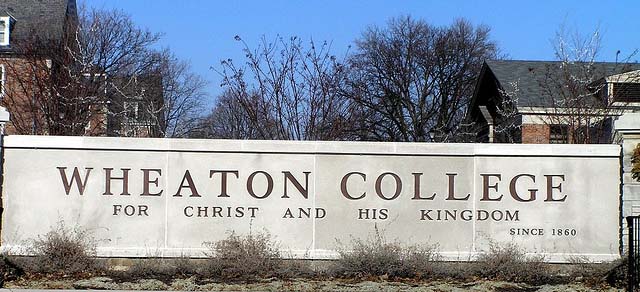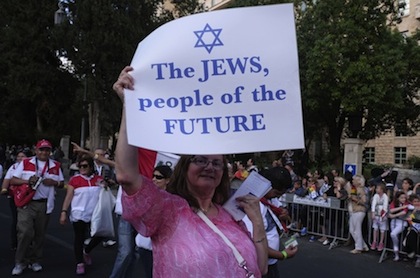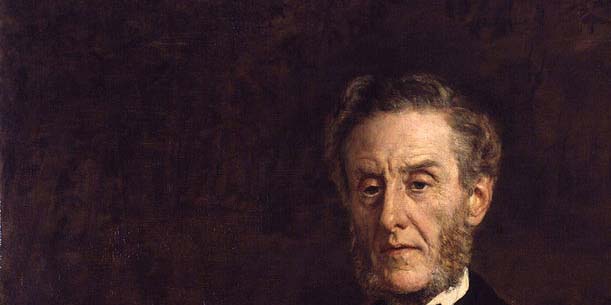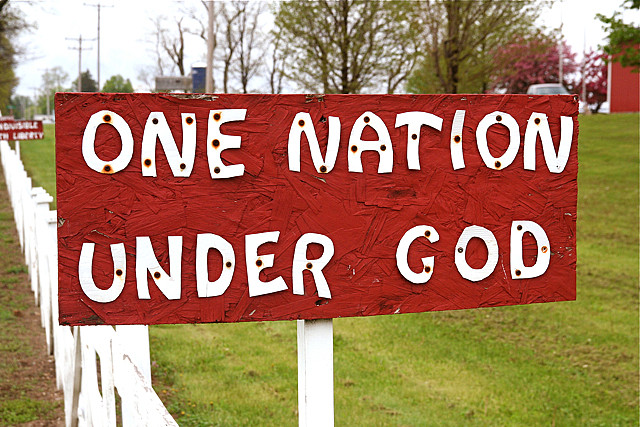Several years ago, I gave a lecture at the American Enterprise Institute (AEI) on the subject of religion and secularism. Afterward, the discussion continued at a relaxed and intimate dinner for selected guests—an occasion greatly enlivened by the presence of the late Irving Kristol, then an AEI senior fellow, and his wife Gertrude Himmelfarb, the distinguished historian. As usual, Irving had plenty to say. In particular, when the subject turned to the distinctive character of evangelical Christianity, he pronounced himself in a manner that I (and others in the room) remember vividly to this day. “Well, after all,” he remarked, with casual assurance, “religion is what you’re born with.”
But no, I insisted in response, that was precisely what evangelicals don’t believe. There are no grandchildren in the kingdom of heaven, they like to say, which is their way of asserting that religious truth is something each person must come to individually through a process of personal conversion, a process that does not require a church or a priest but is thought to be a direct and unmediated act of “coming to Jesus.” Hence there are no legacy admissions, for this faith cannot be inherited or otherwise passed along; it must be re-appropriated freshly by each generation. This is why evangelicals say, following Jesus’ words to Nicodemus, that one must be “born again.” The first birth is not the one that counts.
Irving was completely unmoved by my impromptu catechesis. “Religion is what you’re born with,” he repeated, unraveling an amused smile and seemingly all the more pleased with a formulation that had kicked up some dust in the room. Even his wife sitting next to him, who knows a very great deal about Anglo-American evangelicalism, clearly thought him off-base. “Irving, you don’t understand. . . ,” she started, but then gently shook her head in an exasperation no doubt earned through years of experience.
As for me, with my deep respect for Irving, I couldn’t help beginning to wonder whether he may have understood something important that I was missing.
This little episode came to mind as I read Robert W. Nicholson’s thoughtful open letter to American Jews about evangelical-Jewish relations. It came to mind partly because Kristol was one of the first prominent American Jewish intellectuals to proclaim that Jews ought to be less dismissive of their evangelical admirers, but indeed should learn to cherish evangelicals as loyal and reliable allies, preferable in most ways to secular liberals. This declaration brought down on him a level of wrath and ridicule and repudiation that was stunning in its vehemence. Irving fully expected that reaction, and never showed any sign of being upset by it. He realized that the religion that his Jewish detractors were born with—militantly secular liberalism, welded to a sense of ethnic identity—would impel them to deal harshly, even savagely, with his apostasy.
One thing that Nicholson perhaps underestimates, given his typically evangelical generosity to the ideal of the free and uncoerced conscience, is just how difficult, how very nearly unthinkable, it is for most American Jews to imagine taking seriously the beliefs of most evangelicals. It is hard to judge—and as a non-Jew, I perhaps have no business even trying—whether the greater force in producing this near-unanimity is cultural consensus or cultural fear. Both probably play a role, and the fears involved are powerful ones, manifested not only publicly but on the most intimate levels.
I think of a Jewish friend, a man of impressive intellect and great moral courage, who converted to Christianity after two decades of waiting . . . for his mother to die. If this sounds like the material for a great Jewish joke, it is also powerful testimony to Irving’s contention that religion is what you are born with. For if this man had really fully believed that his eternal salvation depended on his acceptance of Jesus as his savior, would he have waited all those years? Would he have waited ten minutes?
That may be putting it ungenerously. Loyalty to what you were born with carries a weight of moral obligation all its own, not only for Jews but perhaps for Jews especially. Strangely, it seems that this logic of loyalty persists even when the specifically religious elements in Jewish identity have been all but banished in favor of full-bore secular liberalism. That would certainly help explain the vehement reaction to Irving’s daring to say a good word about an evangelical-Jewish alliance.
All this goes to underscore the importance of Nicholson’s message. It is a message that today needs to be heard more than ever as Israel faces mortal peril in a world where it is increasingly alone and abandoned, with anti-Semitism, having acquired a new lease on life, on the rampage. Under the circumstances, American Jews need especially to overcome their hardwired prejudices and see the clear truth that 300 million evangelicals have been, and still are, arguably Israel’s most stalwart non-Jewish allies in the Western world.
Just as important, what needs to be understood is that this stalwart support is not imperishable and that it cannot be taken for granted in the future. Nicholson supports with his own research and interviews the important work of Gerald McDermott in identifying the rise of an anti-Israel movement within American evangelicalism, potentially a very serious and consequential departure.
Nicholson is right about this, and the movement he describes is real. At the same time, however, I would urge caution lest one exaggerate the extent or the durability of anti-Israel evangelicalism—or, for that matter, the size and influence of the American evangelical Left altogether.
Anti-Israel sentiment among evangelical elites is strongest in the academic world and in international missions and relief groups. But the actual influence of such groups on the larger world of American evangelical churches is debatable. One can count on the fingers of two hands, with fingers left over, the number of voluble and publicity-savvy figures on the evangelical Left like Sojourner’s Jim Wallis. (Frank Schaeffer, whom Nicholson quotes as urging “an end to the largely unchallenged influence of Christian Zionism,” is a convert to Eastern Orthodoxy.) And Bethlehem Bible College, while a seedbed for the kind of pro-Palestinian revisionism that is enjoying a run of popularity with the American evangelical Left, is not itself an American college.
So I would be wary and vigilant, but not unduly panicked. The fact is that evangelicalism thrives on a flat and somewhat amorphous ecclesiastical structure, without popes or bishops or prelates. This renders it hard to be captured by ideological missionaries—particularly ones who openly reject the authority of the Bible as so many on the evangelical Left do.
Moreover, figures like Wallis have badly tarnished their credibility by their near-total identification with Democratic-party politics. They made a reputation for themselves post-9/11 by opposing the Bush administration’s anti-terror policies, but their abject and total silence as the Obama administration has continued those same policies, expanding them into areas like the use of unmanned drones to assassinate putative terrorists, has left them utterly discredited in the eyes of many of their idealistic young followers. For years, the evangelical Right has been accused of choosing Caesar over God by aligning itself with the Republican party and conservative politics. Now the charge applies in spades to the evangelical Left.
In any event, much more important, and more worthy of concern, are the “mainline” Protestant denominations, including the Presbyterian Church USA, the Episcopal Church, and others. Their antagonism to Israel is blatant and of long standing; of even longer standing is their fealty to the standard desiderata of theological and political liberalism. Indeed, the growing liberalization of American evangelicalism can itself be seen as a convergence with the beliefs and views of these churches, bleaching out the particularisms inherent in the Jewish and Christian faiths and reducing them to a bland universalism. This is a movement that speaks to the status anxieties of the rising generation of young evangelicals, affluent, suburban-bred, and socially mobile, who are intent that, whatever else their church will be, it will not be the church of their fathers. That is generally what they mean in proclaiming their ideal of a “countercultural” faith.
I do not mean to sound dismissive of this generation. I often lecture in evangelical colleges, and I love the students I meet there. But I am struck by some of the very phenomena that Nicholson describes. They appear to be getting a very limited education, particularly in politics and economics. Instead, they are heavy on emotivism, a disposition that leaves them prepared to speculate endlessly about what they imagine “Jesus would do” but poorly equipped for engagement with challenging points of view.
How to overcome these limitations and what they might portend? I can think of few better ways than by bringing such students into a fuller awareness of the Jewish roots of their own faith. For how can one possibly grasp the Christian doctrine of vicarious atonement, or the meaning of the Eucharist, without understanding how those ideas are grounded in Jewish understandings of sin, guilt, and expiation? How to understand the source of human rights and inviolable dignity without recurring to the biblical belief that man is made in the image of God?
To be sure, the evangelical-Jewish alliance will always be at least partially a matter of strange bedfellows. That can’t be helped, and it shouldn’t be denied. The differences are profound. But at the same time, there is a deep commonality, going to the heart of both faiths and revealed by and through the course of two millennia of human history. It is, I think, most succinctly expressed in the idea that both traditions worship the God of Abraham, Isaac, and Jacob. That phrase carries the weight of a distinct cosmology, anthropology, and moral universe.
This, in other words—and in ways that Jews perhaps understand better than evangelicals—is the religion that both groups have indeed been “born with,” as Irving was right to suggest. That bedrock fact points to at least the possibility of an alliance destined, in the fullness of time, to be of far more than mere political convenience.
___________________
Wilfred M. McClay is the Blankenship Chair in the history of liberty at the University of Oklahoma and director of its Center for the History of Liberty.
More about: Anti-Semitism, Evangelical Christianity, Irving Kristol, Israel, Robert W. Nicholson








